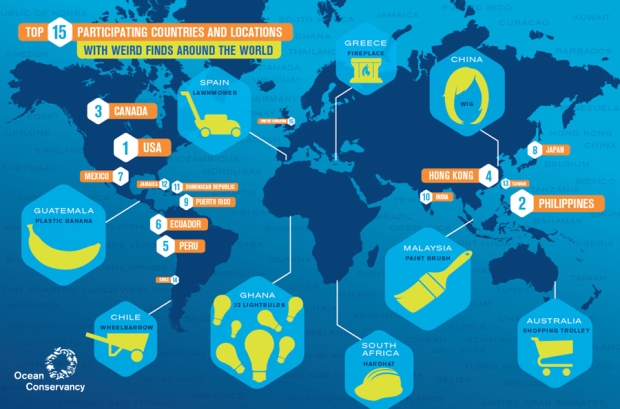Guest post by Sarah Kollar, Coordinator, Trash Free Seas Program
Ocean Conservancy
We face many complex challenges when it comes to a clean and healthy ocean, but one problem is simple to understand: trash. Ocean trash –or marine debris, litter, rubbish, and all the other names we have for it –includes any manufactured item that makes it way to the marine environment, whether intentionally or unintentionally.
The topic has recently jumped to the forefront of many ocean discussions as more and more people are discovering the sheer enormity and numerous impacts of trash in marine environments. But for Ocean Conservancy and the millions of International Coastal Cleanup volunteers around the world, we’ve been tackling ocean trash for nearly three decades.
A Regular Cleanup
Every year, as part of the world’s largest volunteer effort on behalf of the ocean, hundreds of thousands of volunteers join forces to for one day to collect and remove debris from their local waterways and coastlines.
 Beyond removing debris, participants also log the types and amount of trash that plague their specific area and report these data back to Ocean Conservancy. Consequently, from the great work of volunteers across the globe, we have amassed a global database on marine debris which creates better understanding and informs effective solutions.
Beyond removing debris, participants also log the types and amount of trash that plague their specific area and report these data back to Ocean Conservancy. Consequently, from the great work of volunteers across the globe, we have amassed a global database on marine debris which creates better understanding and informs effective solutions.
By collecting, counting and tallying debris, it becomes apparent that ocean trash –no matter where it comes from –is not an ocean problem, but rather a people problem.
The most common items collected during cleanups are those that we use every day. Single-use disposable items, often plastics, are collected by the thousands. And over the years, volunteers have also found many peculiar items, including eight bowling balls, a plastic dinosaur toy, and a fireplace from the 2014 Cleanup.
The Cleanup also shows that we still have work to do. Marine organisms can become trapped or entangled in items like fishing line, which seriously impairs mobility and often leads to death. Furthermore, ingestion of debris has been documents in over 600 marine species including all seven species of sea turtles.
Health Hazards
The impacts do not stop in the water. We too, are greatly affected by ocean trash. Coastal communities and their economies are hindered by trash littering their beaches. Trash in the ocean is both an environmental danger and threat to our own health.
Just as the impacts of debris our numerous and far reaching, so too must be our solutions. It is the collective effort and collaboration of organizations around the world that will help us realize trash free seas. Ocean Conservancy is thrilled to work with the Travel Foundation and the Make Holidays Greener campaign to remind us all to do our part, even as we relax on holiday.
To join in the solution and learn more about our various initiatives to prevent ocean trash at the source, check out www.oceanconservancy.org/our-work/marine-debris. To get involved with the International Coastal Cleanup, check out www.signuptocleanup.org. Follow us on Twitter @OurOcean and find us on Facebook. Thank YOU for all that you do for a cleaner, healthier ocean for all!
Make Holidays Greener month starts today! If you have not already signed up to run a beach clean then please get involved!